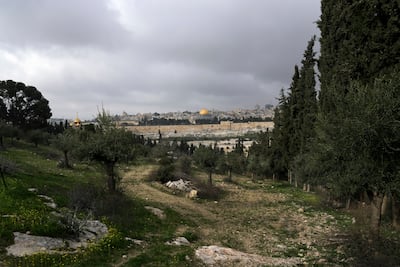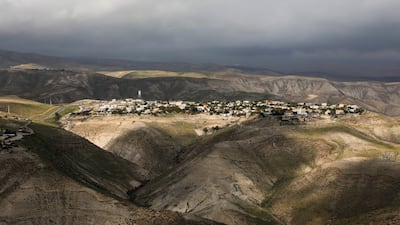Israel’s Nature and Parks Authority on Monday said it had "no intention of advancing" a contentious plan to encompass Christian holy sites on Jerusalem’s Mount of Olives in a national park following opposition from churches.
The Mount of Olives in East Jerusalem rises above Jerusalem’s Old City and its sites are holy to three monotheistic faiths.
Its slopes to the east of the Old City are studded with churches of Christian denominations that mark the traditional places of events in the life of Jesus.
The Armenian, Catholic and Greek Orthodox churches petitioned Israel’s environmental protection minister, whose department is in charge of the parks authority, in a letter last week.
The churches expressed the “gravest concern and unequivocal objection” to the plan to extend the Jerusalem Walls National Park, saying it would disrupt the long-standing state of affairs and aims to “confiscate and nationalise one of the holiest sites for Christianity and alter its nature”.
Farid Jubran, general counsel of the Catholic Church's Custody of the Holy Land, said that making church property part of a national park was “putting the control in the hands of people who have no other agenda but to wipe off any non-Jewish characteristic on this mountain”.
Shortly after the churches' outcry, the Nature and Parks Authority said it was freezing the plan, which was to be approved on March 2 by Jerusalem's planning committee.
The authority said it has “no intention of advancing the plan in the planning committee and it is not ready for discussion without co-ordination and communication with all relevant officials, including the churches, in the area”.
Israeli rights groups and peace campaigners denounced the plan as an attempt to marginalise Palestinian residents and increase the Jewish religious and national significance of the Mount of Olives.
In a joint statement, rights groups Bimkom, Emek Shaveh, Ir Amim and Peace Now said the plan was part of “various mechanisms used by Israel in East Jerusalem to entrench its sovereignty, to marginalise non-Jewish presence and to prevent much needed development of Palestinian neighbourhoods”.
Israel captured East Jerusalem and its Jewish, Christian and Muslim holy sites in 1967 and annexed it in a move that is not recognised by most of the international community.
The holy city is the emotional epicentre of the more than century-long Israeli-Palestinian conflict, and even minor changes to the fragile status quo in Jerusalem has the potential to erupt into violence.
The Palestinians seek East Jerusalem as capital of a future independent state, while Israel considers the city its united capital.
Why it pays to compare
A comparison of sending Dh20,000 from the UAE using two different routes at the same time - the first direct from a UAE bank to a bank in Germany, and the second from the same UAE bank via an online platform to Germany - found key differences in cost and speed. The transfers were both initiated on January 30.
Route 1: bank transfer
The UAE bank charged Dh152.25 for the Dh20,000 transfer. On top of that, their exchange rate margin added a difference of around Dh415, compared with the mid-market rate.
Total cost: Dh567.25 - around 2.9 per cent of the total amount
Total received: €4,670.30
Route 2: online platform
The UAE bank’s charge for sending Dh20,000 to a UK dirham-denominated account was Dh2.10. The exchange rate margin cost was Dh60, plus a Dh12 fee.
Total cost: Dh74.10, around 0.4 per cent of the transaction
Total received: €4,756
The UAE bank transfer was far quicker – around two to three working days, while the online platform took around four to five days, but was considerably cheaper. In the online platform transfer, the funds were also exposed to currency risk during the period it took for them to arrive.
Avatar: Fire and Ash
Director: James Cameron
Starring: Sam Worthington, Sigourney Weaver, Zoe Saldana
Rating: 4.5/5
More on animal trafficking
BMW M5 specs
Engine: 4.4-litre twin-turbo V-8 petrol enging with additional electric motor
Power: 727hp
Torque: 1,000Nm
Transmission: 8-speed auto
Fuel consumption: 10.6L/100km
On sale: Now
Price: From Dh650,000
Leaderboard
63 - Mike Lorenzo-Vera (FRA)
64 - Rory McIlroy (NIR)
66 - Jon Rahm (ESP)
67 - Tom Lewis (ENG), Tommy Fleetwood (ENG)
68 - Rafael Cabrera-Bello (ESP), Marcus Kinhult (SWE)
69 - Justin Rose (ENG), Thomas Detry (BEL), Francesco Molinari (ITA), Danny Willett (ENG), Li Haotong (CHN), Matthias Schwab (AUT)
The specs
Engine: 4.0-litre V8 twin-turbocharged and three electric motors
Power: Combined output 920hp
Torque: 730Nm at 4,000-7,000rpm
Transmission: 8-speed dual-clutch automatic
Fuel consumption: 11.2L/100km
On sale: Now, deliveries expected later in 2025
Price: expected to start at Dh1,432,000
Match info
Uefa Champions League Group H
Juventus v Valencia, Tuesday, midnight (UAE)
THE BIO
Bio Box
Role Model: Sheikh Zayed, God bless his soul
Favorite book: Zayed Biography of the leader
Favorite quote: To be or not to be, that is the question, from William Shakespeare's Hamlet
Favorite food: seafood
Favorite place to travel: Lebanon
Favorite movie: Braveheart
The alternatives
• Founded in 2014, Telr is a payment aggregator and gateway with an office in Silicon Oasis. It’s e-commerce entry plan costs Dh349 monthly (plus VAT). QR codes direct customers to an online payment page and merchants can generate payments through messaging apps.
• Business Bay’s Pallapay claims 40,000-plus active merchants who can invoice customers and receive payment by card. Fees range from 1.99 per cent plus Dh1 per transaction depending on payment method and location, such as online or via UAE mobile.
• Tap started in May 2013 in Kuwait, allowing Middle East businesses to bill, accept, receive and make payments online “easier, faster and smoother” via goSell and goCollect. It supports more than 10,000 merchants. Monthly fees range from US$65-100, plus card charges of 2.75-3.75 per cent and Dh1.2 per sale.
• 2checkout’s “all-in-one payment gateway and merchant account” accepts payments in 200-plus markets for 2.4-3.9 per cent, plus a Dh1.2-Dh1.8 currency conversion charge. The US provider processes online shop and mobile transactions and has 17,000-plus active digital commerce users.
• PayPal is probably the best-known online goods payment method - usually used for eBay purchases - but can be used to receive funds, providing everyone’s signed up. Costs from 2.9 per cent plus Dh1.2 per transaction.
Slow loris biog
From: Lonely Loris is a Sunda slow loris, one of nine species of the animal native to Indonesia, Malaysia, Thailand and Singapore
Status: Critically endangered, and listed as vulnerable on the International Union for Conservation of Nature red list due to growing demand in the global exotic pet trade. It is one of the most popular primate species found at Indonesian pet markets
Likes: Sleeping, which they do for up to 18 hours a day. When they are awake, they like to eat fruit, insects, small birds and reptiles and some types of vegetation
Dislikes: Sunlight. Being a nocturnal animal, the slow loris wakes around sunset and is active throughout the night
Superpowers: His dangerous elbows. The slow loris’s doe eyes may make it look cute, but it is also deadly. The only known venomous primate, it hisses and clasps its paws and can produce a venom from its elbow that can cause anaphylactic shock and even death in humans
THE%20SWIMMERS
%3Cp%3E%3Cstrong%3EDirector%3A%20%3C%2Fstrong%3ESally%20El-Hosaini%3C%2Fp%3E%0A%3Cp%3E%3Cstrong%3EStars%3A%20%3C%2Fstrong%3ENathalie%20Issa%2C%20Manal%20Issa%2C%20Ahmed%20Malek%20and%20Ali%20Suliman%C2%A0%3C%2Fp%3E%0A%3Cp%3E%3Cstrong%3ERating%3A%20%3C%2Fstrong%3E4%2F5%3C%2Fp%3E%0A
ANATOMY%20OF%20A%20FALL
%3Cp%3E%3Cstrong%3EDirector%3A%20%3C%2Fstrong%3EJustine%20Triet%3C%2Fp%3E%0A%3Cp%3E%3Cstrong%3EStarring%3A%20%3C%2Fstrong%3ESandra%20Huller%2C%20Swann%20Arlaud%2C%20Milo%20Machado-Graner%3C%2Fp%3E%0A%3Cp%3E%3Cstrong%3ERating%3A%3C%2Fstrong%3E%205%2F5%3C%2Fp%3E%0A
The bio
Academics: Phd in strategic management in University of Wales
Number one caps: His best-seller caps are in shades of grey, blue, black and yellow
Reading: Is immersed in books on colours to understand more about the usage of different shades
Sport: Started playing polo two years ago. Helps him relax, plus he enjoys the speed and focus
Cars: Loves exotic cars and currently drives a Bentley Bentayga
Holiday: Favourite travel destinations are London and St Tropez
Real estate tokenisation project
Dubai launched the pilot phase of its real estate tokenisation project last month.
The initiative focuses on converting real estate assets into digital tokens recorded on blockchain technology and helps in streamlining the process of buying, selling and investing, the Dubai Land Department said.
Dubai’s real estate tokenisation market is projected to reach Dh60 billion ($16.33 billion) by 2033, representing 7 per cent of the emirate’s total property transactions, according to the DLD.
How to avoid crypto fraud
- Use unique usernames and passwords while enabling multi-factor authentication.
- Use an offline private key, a physical device that requires manual activation, whenever you access your wallet.
- Avoid suspicious social media ads promoting fraudulent schemes.
- Only invest in crypto projects that you fully understand.
- Critically assess whether a project’s promises or returns seem too good to be true.
- Only use reputable platforms that have a track record of strong regulatory compliance.
- Store funds in hardware wallets as opposed to online exchanges.
CONFIRMED%20LINE-UP
%3Cp%3EElena%20Rybakina%20(Kazakhstan)%0D%3Cbr%3EOns%20Jabeur%20(Tunisia)%0D%3Cbr%3EMaria%20Sakkari%20(Greece)%0D%3Cbr%3EBarbora%20Krej%C4%8D%C3%ADkov%C3%A1%20(Czech%20Republic)%0D%3Cbr%3EBeatriz%20Haddad%20Maia%20(Brazil)%0D%3Cbr%3EJe%C4%BCena%20Ostapenko%20(Latvia)%0D%3Cbr%3ELiudmila%20Samsonova%0D%3Cbr%3EDaria%20Kasatkina%E2%80%AF%0D%3Cbr%3EVeronika%20Kudermetova%E2%80%AF%0D%3Cbr%3ECaroline%20Garcia%20(France)%E2%80%AF%0D%3Cbr%3EMagda%20Linette%20(Poland)%E2%80%AF%0D%3Cbr%3ESorana%20C%C3%AErstea%20(Romania)%E2%80%AF%0D%3Cbr%3EAnastasia%20Potapova%E2%80%AF%0D%3Cbr%3EAnhelina%20Kalinina%20(Ukraine)%E2%80%AF%E2%80%AF%0D%3Cbr%3EJasmine%20Paolini%20(Italy)%E2%80%AF%0D%3Cbr%3EEmma%20Navarro%20(USA)%E2%80%AF%0D%3Cbr%3ELesia%20Tsurenko%20(Ukraine)%0D%3Cbr%3ENaomi%20Osaka%20(Japan)%20-%20wildcard%0D%3Cbr%3EEmma%20Raducanu%20(Great%20Britain)%20-%20wildcard%3Cbr%3EAlexandra%20Eala%20(Philippines)%20-%20wildcard%3C%2Fp%3E%0A












